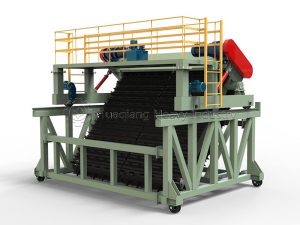In tropical plantations, an exciting transformation is taking place. What was once considered waste – oil palm empty fruit bunches (OPEFB) – is now undergoing a remarkable metamorphosis through innovative chain compost turners and complete organic fertilizer production lines, turning environmental burdens into valuable resources.
Chain Compost Turners: The Core Engine of Composting Technology
Chain compost turner have revolutionized traditional composting methods with their unique design and efficient operation. Unlike ordinary turning equipment, chain systems utilize multiple sets of chains working in coordination to penetrate deep into the compost pile, achieving comprehensive, dead-angle-free turning effects. This design is particularly suitable for processing raw materials with high fiber content like OPEFB, ensuring every inch of material receives adequate oxygen supply.
“It’s like giving the compost materials professional therapeutic massage,” vividly a technical supervisor from a Malaysian plantation. “The chain turner not only mixes evenly but, more importantly, creates ideal ventilation conditions for beneficial microorganisms to thrive.”
Complete Organic Fertilizer Production Line: A Precision System of Collaborative Operations
The chain compost turner is just one crucial component in the entire organic fertilizer production system. A complete production line includes:
Pre-treatment equipment: Crushing and screening OPEFB to achieve appropriate particle size
Batching system: Precisely adjusting carbon-to-nitrogen ratios and adding necessary microbial agents
Chain compost turners: Providing regular turning and aeration during fermentation
Post-treatment equipment: Including drying, granulation, and packaging processes
Deodorizing system: Ensuring environmental friendliness during production
A Perfect Example of Circular Economy
This advanced production line not only solves the disposal challenges of OPEFB but also creates significant economic and environmental benefits. Plantation owners are finding that they not only save on waste disposal costs but also produce high-quality organic fertilizers that in turn improve soil quality in their plantations.
“We’re completing a perfect cycle,” says an Indonesian sustainable agriculture expert. “Waste becomes resources, and resources give back to the land – this model truly achieves sustainable development.”
As global demand for sustainable agriculture grows, this technology of converting agricultural waste into quality fertilizer is rapidly spreading across tropical regions worldwide. It not only improves local environments but also provides more eco-friendly and economical solutions for agricultural production.
From troublesome agricultural byproducts to sought-after organic fertilizers, the transformation journey of OPEFB demonstrates the tremendous potential of modern environmental technologies. In this process, chain compost turners, with their excellent performance and adaptability, have become key forces driving this green revolution.



